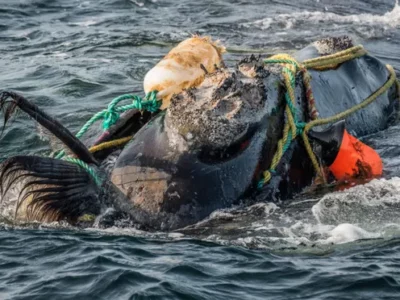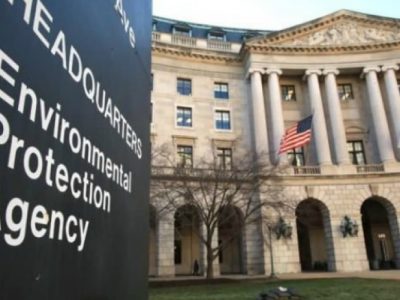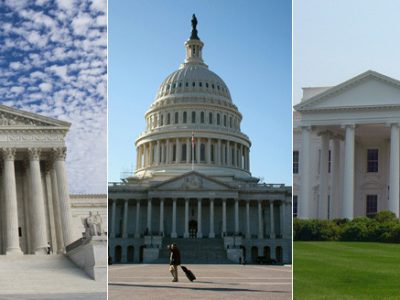Litigation
Three Questions about the Ninth Circuit Panel’s CRA v. Berkeley Decision
This recent decision has important implications for state and local efforts to protect their residents and reduce greenhouse-gas emission, but boy is it hard to wrap your head around.
On Monday, a three-judge panel of the Ninth Circuit issued a ruling in California Restaurant Association v. City of Berkeley, addressing whether the federal Energy Policy and Conservation Act (EPCA) invalidates a Berkeley municipal ordinance specifying when natural-gas infrastructure can be extended into new buildings. Many in the housing-quality and building-decarbonization space have been eagerly …
Continue reading “Three Questions about the Ninth Circuit Panel’s CRA v. Berkeley Decision”
CONTINUE READINGFighting Back Against Lawless Judges: What Does The Case Law Actually Say?
Current standards for declaratory judgments could allow the Biden administration to pre-empt.
Three weeks ago, I argued that the Biden Administration should use the declaratory judgment as a way of pre-empting lawless judges like Matthew J. Kacsmaryk and Reed O’Connor, both of (of course) Texas. I fleshed out the idea in a recent piece for The American Prospect. Since then, the problem has only gotten worse, as …
Continue reading “Fighting Back Against Lawless Judges: What Does The Case Law Actually Say?”
CONTINUE READINGDo Climate Change Cases Belong in Federal Court? The Biden Administration Weighs In.
In a very narrowly argued brief, the Administration calls for returning the cases to state court.
The Biden Administration, at the Supreme Court’s invitation, has now filed a brief giving its views about current lawsuits against oil companies. The gist of the brief is that the cases belong in state court., and that the Court should let that happen rather than stepping into the litigation. The brief is right about that, …
CONTINUE READINGLobster Wars
An industry lawsuit against Monterey Aquarium is a blatant assault on free speech.
The Maine lobster industry is suing the Monterey Aquarium for advising consumers to avoid Maine lobsters. This is “cancel culture” on steroids. The Aquarium has taken a stand the industry doesn’t like, so the industry is trying to silence it and its other critics. “Silencing” here is quite literal: the industry is seeking an injunction …
Continue reading “Lobster Wars”
CONTINUE READINGCritical Native American Water Rights Cases Come Before the Supreme Court: Arizona v. Navajo Nation
The Navajo Nation Has the Equities on Its Side, But the U.S. Department of the Interior May Well Have the Law in Its Favor
Today the U.S. Supreme Court hears oral arguments in the last natural resources cases on its docket this Term: Arizona v. Navajo Nation and U.S. Department of the Interior v. Navajo Nation. These consolidated cases are consequential for several reasons: to determine the scope of the federal government’s trust obligations to Native American tribes; to …
CONTINUE READINGCEQA, California’s Housing Crisis & the Little Hoover Commission
State Watchdog Agency’s Scheduled CEQA Hearings Could Prompt Major Changes to California’s Most Important Environmental Law
Beginning today, California’s “Little Hoover Commission” will convene a series of three public hearings to consider how well–or poorly–the state’s California Environmental Quality Act (CEQA) is currently working. A special focus of the Commission’s deliberations will be whether and to what extent California’s most important and overarching environmental law is impeding efforts by the Legislature …
Continue reading “CEQA, California’s Housing Crisis & the Little Hoover Commission”
CONTINUE READINGHow Do You Solve A Problem Like A Lawless Judge?
Some counsel for the Justice Department from The Great One.
The eyes of nearly everyone are upon Texas – on Amarillo, specifically, where comically lawless federal Judge Matthew J. Kacsmaryk will soon decide if the FDA illegally approved the medication mifepristone, sometimes thought of as the “abortion pill.” One might think that it’s somewhat too late to challenge a two-decade old approval based upon impeccable …
Continue reading “How Do You Solve A Problem Like A Lawless Judge?”
CONTINUE READINGTwo Cheers For CEQA
A recent case shows why the law is so important – and how it can be abused
Even the best and conscientious developers gnash their teeth at CEQA, California’s environmental review law, and one can see why: it can allow NIMBYs to block useful housing and supercharge exclusion. But there’s a reason why the law was passed and why it has persisted, and we saw it three days ago: Trees of Los …
Continue reading “Two Cheers For CEQA”
CONTINUE READING50 Years Ago: Environmental Law in 1973
Five decades back, the country was in the midst of unprecedented environmental ferment.
1973 was at the crest of the environmental surge that swept the United States half a century ago. In the previous three years, Congress had passed NEPA, the Clean Air Act, and the Clean Water Act. The first EPA Administrator took office in 1971. Continuing the legislative wave, 1973 saw the passage of the Endangered …
Continue reading “50 Years Ago: Environmental Law in 1973”
CONTINUE READING30 Years of U.S. Climate Policy
Here’s a timeline of the victories and defeats since 1992.
Thirty years ago, the United States joined the U.N. Framework Convention on Climate Change (UNFCCC). The decades since then have been a saga of victories and defeats for U.S. climate policy. Progress has been made under one President, only to be battered down by the next one. This to-and-fro is a sobering reminder of how …
Continue reading “30 Years of U.S. Climate Policy”
CONTINUE READING













